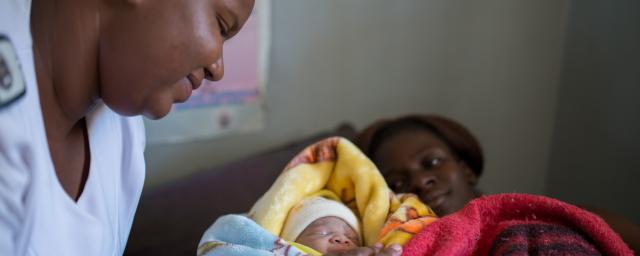
Many countries are burdened with massive amounts of debt owed to richer countries, private banks and multilateral institutions. This has constrained their governments from being able to free up resources to spend on public prevention and response. Photo: Aurelie Marrier D'Unienville/Oxfam
Over the past months, we've seen some of the richest countries in the world struggle with the effects of Covid-19 and the health and economic emergency it has brought in its wake. But at least they have the resources to cushion the blows, while poor countries face these huge threats with few resources.
The pandemic has overwhelmed some of the best healthcare systems in the world. But the crisis could get much worse as the virus takes hold in countries where people are already suffering from a lack of adequate or affordable health care:
- The Central African Republic has only 3 ventilators for the entire country.
- Tanzania has one doctor for every 71,000 people.
- Kenya has only 130 beds in intensive care units for a population of nearly 50 million people.
We know it is the countries with universal and publicly provided healthcare that will be best placed to get through this crisis. Yet in most countries, health services are desperately weak and deeply unequal. You can only get treatment if you have money.
Which brings us to debt.
Faced with an impossible choice – pay back debts or invest in health care
Many countries are burdened with massive amounts of debt owed to richer countries, private banks and multilateral institutions such as the IMF and World Bank.
The level of public external debt accumulated by developing countries is staggering. In 2018 it had reached $457 billion for 73 countries. If we look at 2020 alone, the 76 poorest countries are due to pay $40.6bn. This has constrained their governments from being able to free up resources to spend on public prevention and response.
Every dollar of debt repayment is a dollar that can't be used to protect people from disease, hunger and destitution. Last year 64 of the world's poorest countries spent more on paying back debts to rich countries and financial institutions than on health care.
Rich countries must #CancelTheDebt to save lives
Healthcare systems in some of the world's poorest countries need an urgent cash injection to tackle this crisis. Debt relief is the fastest way of getting money to where it's needed most. It could free up $40 billion this year alone, to help these countries fight the virus and its brutal economic impacts.
In April 2020, the G20 agreed a temporary suspension of debt payments for 73 countries. This was a welcome first step, but it is nowhere near enough.
The agreement failed to address the massive debts to private creditors like banks and hedge funds, or some of the biggest multilateral lenders like the World Bank – to which many developing countries owe huge sums.
Together we can protect each other and create a fair future for us all
This is a global public health emergency bigger than anything humanity has ever seen. If left unchecked, coronavirus could cause up to 40 million deaths around the world and push half a billion more people into poverty. The speed at which the pandemic has spread around the world shows that countries cannot defeat the virus on their own, more than ever we need a global response.
The demands for debt cancellation have continued to build over the last few months – from leaders in the African Union, to over 800,000 people who have signed petitions calling for urgent debt relief, including in support of Oxfam’s letter from health workers around the world.